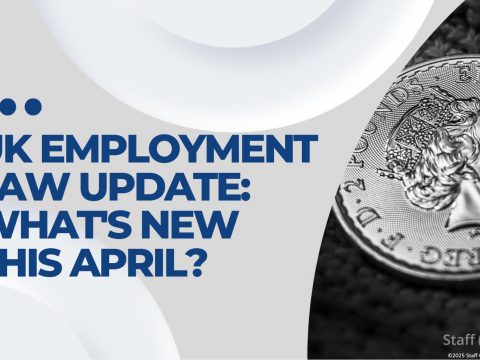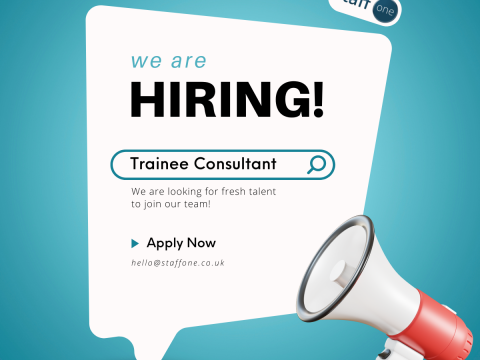- Contact us:
- 03300 535 600
- hello@staffone.co.uk
Written by the CV-Library Content Team
You’re about to negotiate your salary, either with an existing or a new employer. Your heart is pounding. What if you pitch yourself too high – or too low? What will you do if your request is dismissed out of hand? What’s a realistic salary in your industry – what do you need to keep your life running smoothly?
It’s not easy to talk about money at the best of times, and salary negotiation is not a skill we’re formally taught. Nevertheless, everyone will face this negotiation at some point in their career – and it’s a lot easier to do this now that salary transparency in job adverts is an emerging trend.
Here are some tips to help you negotiate the best possible salary for your role.
What you need to consider before entering negotiations
Before you discuss your salary, make sure you’ve considered the following points. There are no right or wrong answers here but being aware of the issues will make sure you don’t get derailed before you’ve had a chance to state your case.
- What are you entitled to by law?
- What’s the minimum you need to earn to sustain the life you live? Any offer below this amount isn’t going to be sustainable in the long run.
- Is there a ‘going rate’ in your industry? Knowing this will help you ensure that you position yourself realistically.
- What are you worth? This is a tricky one to calculate, but think about the specific skills, qualifications and experience you bring to the role, and then pitch this against other issues such as the ‘going rate’ in your industry and the size of the company you’ll be working for.
Let’s look at some of these issues in more detail.
The living wage and regional/sector variations
Everyone working in the UK is entitled to a minimum wage, established by the government to make sure that all workers receive fair pay. The amount you could receive varies according to your age. The following table shows the rates that apply from 1 April 2023, and is taken from the government’s website.
| Rate from April 2023 | |
| National Living Wage | £10.42 |
| 21—22-year-old rate | £10.18 |
| 18—20-year-old rate | £7.49 |
| 16—17-year-old rate | £5.28 |
| Apprentice rate | £5.28 |
You can check whether or not you’re receiving or being offered the minimum age for your age bracket using the government’s own calculator.
Check out CV-Library’s Career Guides for more salary ranges by sector. You can also check our salary guides page. Remember that pay can vary across the country – a job in London will offer a different salary than a job in Sheffield. Our Location Guides detail average salaries in a variety of places throughout the UK.
ACAS helpline and other resources
If you are earning less than you are legally entitled to according to the table above, contact ACAS, the Advisory, Conciliation and Arbitration Service. They offer advice on a range of workplace issues and will also act on confidential complaints.
Knowing what you need versus what you want
Everyone would like to earn more money but it’s important to know exactly what your lower limit is. Take the time to review your finances and work out your weekly, monthly and annual budget before you negotiate your salary.
There is a lot of advice on the internet, and even a range of apps to help you keep track of your money. But all you really need to do at this stage is make a list of your outgoings and expenses and consider where you might need to, or be willing to, cut back.
Perhaps you have memberships you no longer use. Could you walk more and drive less? Do you need to trim your takeaway habit?
The point here is to focus your mind on what you spend and why you spend it, so that you can have a clear idea about the minimum amount you’re able to work for. No one is asking you to live at your base line, but you do need to know what your baseline is in order to start building what you want.
Once you know what you need, you can more clearly evaluate what to ask for.
Negotiating your salary
Make sure you don’t accept a new job offer too quickly without properly considering the salary on offer, especially if this is the dream job you’ve been waiting for! There’s no point in loving your job and learning loads of great skills if you can’t pay your rent or mortgage.
To get the salary you deserve, you need to arm yourself with a few facts. The salary you are already on, or your most recent salary, is a good place to start, not least because it’s a good indicator of your marketplace ‘worth’.
You can look at similar roles on recruitment sites to build up an idea of the average salary for someone in your position. Some workplace review sites offer information on salary ranges for certain types of career. Build a clear picture of the realistic salary range for someone in your position and at your level of experience.
You should also consider the benefits that the role might offer, such as pension, car allowance, parking, cycle-and-walk-to-work schemes, and insurances. Sometimes the benefits package can offset a lower salary, so make sure you ask about the benefits package as part of your salary negotiations.
It’s useful to enter negotiations with a clear idea of how low you’re willing to go, although you shouldn’t reveal this. And don’t forget to ask about smaller details like whether or not you’ll be paid for overtime.
Considering what you have to offer
Whether you’re asking for a pay rise, or negotiating your salary for a new job, try and get a clear idea of what you’re worth in terms of the skills, qualifications and experience you bring to the job. This includes soft skills like the ability to communicate effectively, your track record running a team, or your ability to multitask.
Really look at the responsibilities you’ve already taken on, or those you’re being asked to take on, and evaluate what you bring to the company. If you’re looking for a salary rise, try opening the discussion with: ‘I’ve been thinking about the responsibilities I’ve taken on recently and how they’re reflected in my pay…’
Opening the discussion
If you’re looking for a pay rise, you need to set the scene for a formal discussion – this is not a discussion to raise when you happen to catch your boss in the staff kitchen or they’re walking by your desk.
Instead, book a meeting with them and let them know what you want to discuss. This way you’ll have their undivided attention and you can both come prepared. Lay out your case and don’t be put off – a pay rise might not always be possible, but you deserve to be heard and it’s important to register your request so that you don’t get overlooked.
Where possible, ask for more than you believe you’ll get so that you have some room to come down if necessary. You never know – you might get lucky!
If you’ve done your preparation and believe you have a case for asking for more money, stand your ground and lay down your arguments clearly. Don’t be aggressive but don’t be embarrassed either. This is a legitimate business negotiation; you aren’t asking for a personal favour.
Not getting what you’re asking for
Sometimes your employer can’t give you what you’re asking before, even if they agree that you’re worth it, because the money isn’t there in the business.
This is when you need to consider other factors, like the benefits, the experience you’ll be getting, whether or not the business will be able to pay you more in future, and so on. You could also try negotiating for other types of benefit to offset the lack of a raise: perhaps the company can offer more annual leave, or allow you to work from home more often, or subsidise your travel costs.
Whether or not you get the raise or the salary you’ve requested, you’ve registered what you want with your boss, and that puts you in a good position when the next salary review comes up. Keep proving yourself and make sure your boss sees your worth so that, when the money becomes available, you’ll be first in line for a raise.






